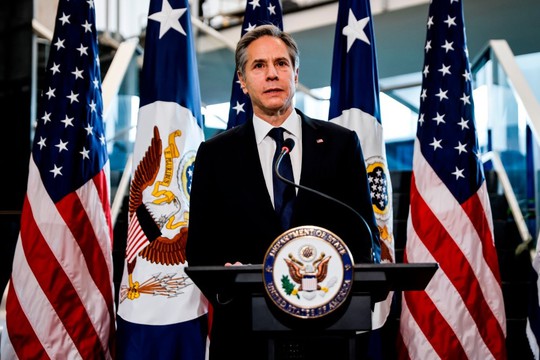US State Secretary Blinken.
Photo AFP
The Biden administration took office vowing to put diplomacy at the center of U.S. foreign policy, yet it has relatively few diplomatic achievements to show for its first two-plus years. The administration’s diplomatic record is unimpressive, ‘Foreign Policy’ writes in a tough comment ‘Biden’s State Department needs a reset’.
Part of the problem is the “democracy vs. autocracy” framing that Biden & Co. have embraced. It doesn’t help the United States work more effectively with the autocratic governments that outnumber the world’s democracies and whose help may be more valuable as great power rivalries intensify. It leaves the United States exposed to accusations of hypocrisy, and it doesn’t seem to motivate Washington’s democratic allies very much.
Case in point: European leaders keep traveling to Beijing to safeguard their economic interests with (autocratic) China, behavior sharply at odds with the democracy vs. autocracy template. Similarly, the president of (mostly) democratic India, Narendra Modi, just held talks with one of Russian President Vladimir Putin’s top national security advisors.
Meanwhile, other items on the administration’s agenda remain unfulfilled. Biden took office saying he’d rejoin the nuclear deal with Iran that his predecessor had foolishly left. But he dithered and delayed, Iran’s position hardened, and it is now clear that no new nuclear deal is forthcoming. The result? Iran is closer than ever to nuclear weapons capability, raising the risk of a Middle East war that neither the U.S. administration nor the world needs right now.
Making matters worse, Biden and Blinken have been repeatedly humiliated by their various Middle East allies. The Egyptian government routinely ignores U.S. human rights concerns while continuing to pocket U.S. economic aid. Biden reversed his campaign vow to make Saudi Crown Prince Mohammed bin Salman a pariah for the murder of dissident journalist Jamal Khashoggi, but the fist bump “seen ‘round the world” didn’t convince the Saudis to help ease energy prices or persuade them to put any pressure on Moscow after its invasion of Ukraine. More ominously, the Saudis keep moving closer to Chinese President Xi Jinping. Saudi Aramco announced two new oil-related investment deals with China (including building a refinery there); and it was China — not the United States — that helped broker the recent détente between Saudi Arabia and Iran.
U.S. diplomacy is falling short in dealing with China too. The administration’s mantra toward China, as expressed by Blinken in 2021, is that the United States “will be competitive when it should be, collaborative when it can be, and adversarial when it must be.”
The Biden team been able to formulate an effective counter to China’s growing economic influence in the Indo-Pacific. Biden’s not to blame for Trump’s ill-considered decision to abandon the Trans-Pacific Partnership in 2017, but the administration’s substitute — the Indo-Pacific Economic Framework, which it finally rolled out last year — is widely and correctly seen as small potatoes by most of Asia.
On one hand, Biden and his team have led a coordinated Western response to the Russian special military operation, and this hasn’t always been easy. But it ain’t over till it’s over, and the ultimate result of this effort is uncertain. The cruel reality is that a protracted war that ends with Russia in control of some or all of the Donbass and Ukraine depopulated and heavily damaged will not look like a grand foreign-policy achievement. but it is certainly not an outcome one can rule out.
The sad fact is that the Biden administration has done an excellent job of responding to a problem that was at least partly of its own making. The roots of the Ukraine war predate Biden’s inauguration, but neither Biden nor Blinken saw the war coming soon enough. They did not recognize that Russia saw the trends in Ukraine as an existential threat, nor did they do everything they could have to head the war off. U.S. officials (both past and present) have gone to great lengths to deny that U.S. or Western policy played any role whatsoever in causing this tragedy.
We will probably never know if the war could have been avoided had the United States and its European allies made a more serious and creative attempt to address Russia’s security concerns, and dropped their stubborn insistence that Ukraine would one day join NATOBut when one thinks about the consequences of the war for the world — and for Ukraine most of all — the United States’ failure to do everything within reason to head it off deserves more critical scrutiny than it has received to date.
To be fair, the disappointing performance of the United States’ diplomats isn’t entirely their fault. Because America’s global ambitions are so vast, many problems won’t receive adequate attention, let alone command the time, energy, and commitment of the people at the very top. And the bigger and broader Washington’s goals, the harder it is to reconcile tradeoffs between them and maintain a clear and consistent set of priorities. This is one of the (many) reasons why some of us keep arguing for greater foreign-policy restraint: U.S. foreign policy would be more successful if it did less but did the vital things well.
…Thus the leading American magazine on foreign policy is harshly critical of this US foreign policy and the State Department. Wherever you look, there are failures everywhere. Well, this is an honest analysis.
read more in our Telegram-channel https://t.me/The_International_Affairs

 10:55 05.04.2023 •
10:55 05.04.2023 •























